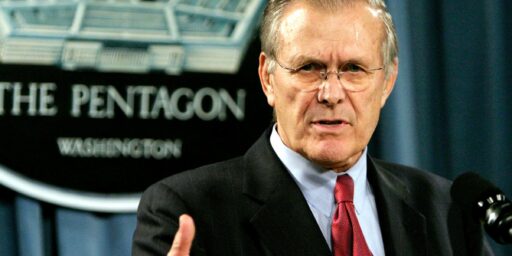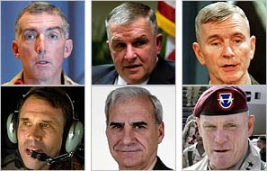NOT BEN STEIN’S MONEY
Ben Stein has, for reasons unknown to me, been given column space in USA Today to explain why we need to increase defense spending and the size of the military.
But we have stretched a much too small military to the breaking point. The United States has virtually no reserves to use if North Korea should invade the South, or if China should invade Taiwan or if we need to fight in Iran or anywhere else.
To be sure, Defense Secretary Donald Rumsfeld has said often on talk shows that he has enough resources. He will make do, he says, by streamlining and changing doctrine. But doctrine does not catch and kill al-Qaeda terrorists. Soldiers do that. Doctrine cannot interdict North Korean ships carrying nuclear arms. Ships and sailors do that. Streamlining does not get fuel into jets for long distance missions. Money and human beings and weapons do that. The truth is that Rumsfeld needs money — and a lot more of it.
While it’s arguable that we need more troops, this rationale doesn’t justify it. For one thing, doctrine sure as hell does matter. The so-called Offset Strategy of the late 1970s, which spawned the Revolution in Military Affairs, is the primary reason the U.S. Armed Forces are the superb fighting machine they now are. We’ve chosen to use weapons and C4ISR (command, control, communications, computers, surveillance, intelligence, and reconnaisance) systems as force multipliers to use far fewer soldiers to fight our wars, exchanging gold for blood. It has worked splendidly.
The only obstacle to fighting these wars simultaneously is lack of adequate strategic lift assets, not bodies. The Iraq War showed, yet again, that relatively few troops can get the job done in combat situation.
Where we need more troops is 1) bodies for peacekeeping operations and 2) additional military police, linguist, civil affairs, psychological operations, and other special operations types. The former could be done by non-U.S. troops; the latter not.





I think Stein is right – we need more troops, of the rifle-wielding variety, but some of the support side, too.
The services (and I’m thinking specifically of the Army here) cannot long continue an operations cycle that leaves 80% or more of active duty forces deployed overseas, and/or relies mainly on Reserve and Guard units for critical war-fighting functions.
Re-enlistment rates are already falling. The force structure can’t continue as is.
Russ,
I agree that there’s an optempo problem, but that’s a different issue. More troops might solve it. But, since we’ve got a 4th Generation military and the main optempo stresses are coming from low-level peace ops, handing those tasks over to other countries is the more logical solution. That would require building better relations, obviously. We could even foot much of the bill, as troops from the 3rd World are markedly cheaper.
Well, given that in Iraq we faced:
1) a deteriorating military
2) which melted into the population
3) which we heavily bribed
I’m not sure we can use Iraq as a stereotype representing… say… Iran or N. Korea.
I’m not saying we don’t have a kick ass military and that you’re not right. It would just seem that using Iraq as an exemplar is perhaps not appropriate for future threats.
John,
Iraq–and Afghanistan before it–still showed a geometric improvement in our force compared even to, say, Grenada in 1983. Typically, in conventional ops, even relatively ragtag forces have been harder to defeat and imposed more casualties.
Interesting. Thanks.
—